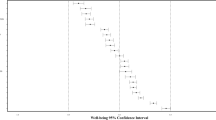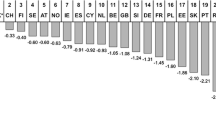Abstract
Nation-level subjective well-being (SWB) indicators (e.g., happiness and life satisfaction) have received increased interest among researchers and policy makers. This increased interest has led to questions about the measurement and comparability of SWB scores. In this paper, we examined the comparability of scores derived from scale transformations (e.g., the “linear stretch method”): a procedure that places SWB scales with different scale points (e.g., 3-points, 4-points) on a common metric. Controlling for nation-level and temporal trends, our results reveal that scale transformations potentially lead to biases for both happiness and life satisfaction scales. Moreover, these potential biases may affect substantive research. This is illustrated when we demonstrate that scale transformations may substantially attenuate the relation between national Gross Domestic Product per capita and happiness. Implications of these findings and limitations of the current study are discussed.



Similar content being viewed by others
References
Abdel-Khalek, A. M. (2006). Measuring happiness with a single-item scale. Social Behavior and Personality: An International Journal, 34(2), 139–150.
Arampatzi, E., Burger, M. J., & Veenhoven, R. (2015). Financial distress and happiness of employees in times of economic crisis. Applied Economic Letters, 22(3), 173–179.
de Jonge, T., Veenhoven, R., & Arends, L. (2014). Homogenizing responses to different survey questions on the same topic: Proposal of a scale homogenization method using a reference distribution. Social Indicators Research, 117(1), 275–300.
Diener, E. (1984). Subjective well-being. Psychological Bulletin, 95, 542–575.
Diener, E. (2000). Subjective well-being: The science of happiness and a proposal for a national index. American Psychologist, 55(1), 34–43.
Diener, E., & Biswas-Diener, R. (2002). Will money increase subjective well-being? A literature review and guide to needed research. Social Indicators Research, 57(2), 119–169.
Diener, E., & Seligman, M. E. P. (2004). Beyond Money. Psychological Science in the Public Interest (Wiley-Blackwell), 5(1), 1–31.
Diener, E., Inglehart, R., & Tay, L. (2013a). Theory and validity of life satisfaction scales. Social Indicators Research, 112(3), 497–527.
Diener, E., Tay, L., & Oishi, S. (2013b). Rising income and the subjective well-being of nations. Journal of Personality and Social Psychology, 104(2), 267–276.
Easterlin, R. A. (1974). Does economic growth improve the human lot? In P. A. David & M. W. Reder (Eds.), Nations and households in economic growth (pp. 89–125). New York: Academic Press.
Easterlin, R. A. (1995). Will raising the incomes of all increase the happiness of all? Journal of Economic Behavior & Organization, 27(1), 35–47.
Easterlin, Richard. A. (2005). Feeding the illusion of growth and happiness: A reply to Hagerty and Veenhoven. Social Indicators Research, 74(3), 429–443.
Extremera, N., & Fernandez-Berrocal, P. (2013). The subjective happiness scale: Translation and preliminary psychometric evaluation of a Spanish version. Social Indicators Research, 119(1), 473–481.
Fischer, R., & Boer, D. (2011). What is more important for national well-being: money or autonomy? A meta-analysis of well-being, burnout, and anxiety across 63 societies. Journal of Personality and Social Psychology, 101(1), 164.
Fischer, R., & Van de Vliert, E. (2011). Does climate undermine subjective well-being? A 58-nation study. Personality and Social Psychology Bulletin, 37(8), 1031–1041.
Frey, B. S., & Stutzer, A. (2002). What can economists learn from happiness research? Journal of Economic Literature, 40(2), 402–435.
Graham, C. (2005). Insights on the development from the economics of happiness. World Economics, 6(3), 41–55.
Hagerty, M. R., & Veenhoven, R. (2003). Wealth and happiness revisited- growing national income does go with greater happiness. Social Indicator Research, 64(1), 1–27.
Inglehart, R., Foa, R., Peterson, C., & Welzel, C. (2008). Development, freedom and rising happiness: A global perspective 1981–2006. Perspectives on Psychological Science, 3(4), 264–285.
Judge, T. A., & Kammeyer-Mueller, J. D. (2011). Happiness as a societal measure. Academy of Management Perspectives, 25(1), 30–41.
Kalmijn, W., Arends, L., & Veenhoven, R. (2010). Happiness scale interval study. Methodological considerations. Social Indicators Research, 102(3), 497–515.
Liao, P. (2013). More happy or less unhappy? Comparison of the balanced and unbalanced designs for the response scale of general happiness. Journal of Happiness Studies, 15(6), 1407–1423.
Lim, H. E. (2008). The use of different happiness rating scales: Bias and comparison problem? Social Indicators Research, 87(2), 259–267.
National Research Council. (2013). Subjective well-being: Measuring happiness, suffering, and other dimensions of experience. Washington: The National Academies Press.
OECD. (2013). How’s life? 2013: Measuring well-being. Paris: OECD Publishing.
Ovaska, T., & Takashima, R. (2010). Does a rising tide lift all the boats? Explaining the national inequality of happiness. Journal of Economic Interest, 44(1), 205–223.
Pinheiro, J., & Bates, D. (2000). Mixed-effects models in S and S-Plus. Berlin: Springer.
Pinheiro, J., Bates, D., DebRoy, S., Sarkar, D., & R Core Team. (2015). Nlme: Linear and nonlinear mixed effects models. R package version 3.1-119.
Development Core Team R. (2015). R: A language and environment for statistical computing. Vienna: R Foundation for Statistical Computing.
Schwarz, N. (1999). Self-reports: How the questions shape the answers. American Psychologist, 5(2), 93–105.
Schwarz, N., & Strack, F. (1999). Reports of subjective well-being: Judgmental processes and their methodological implications. In D. Kahneman, E. Diener, & N. Schwarz (Eds.), Well-being: The foundations of hedonic psychology (pp. 61–84). New York: Russell Sage Foundation.
Steel, P., & Ones, D. S. (2002). Personality and happiness: A national-level analysis. Journal of Personality and Social Psychology, 83(3), 767.
Tay, L., Herian, M. N., & Diener, E. (2014). Detrimental effects of corruption on subjective well-being: Whether, how, and when. Social Psychological and Personality Science, 6(1), 751–759.
Veenhoven, R. (1995). World database of happiness. Social Indicators Research, 34(3), 299–313.
Veenhoven, R. (2004). World database of happiness: Continuous register of research on subjective appreciation of life. Retrieved from http://hdl.handle.net/1765/8683.
Veenhoven, R. (2009). World database of happiness tool for dealing with the ‘Data-Deluge’. Psihologijske teme, 18(2), 221–246.
Veenhoven, R. (2014). World Database of Happiness, [Data Set]. Retrieved from http://worlddatabaseofhappiness.eur.nl.
Veenhoven, R., & Vergunst, F. (2014). The Easterlin illusion: Economic growth does go with greater happiness. International Journal of Happiness and Development, 1(4), 311–343.
World Bank (2014). GDP per capita (current US$). Retrieved from http://databank.worldbank.org/data/views/reports/tableview.aspx.
Author information
Authors and Affiliations
Corresponding author
Rights and permissions
About this article
Cite this article
Batz, C., Parrigon, S. & Tay, L. The Impact of Scale Transformations on National Subjective Well-Being Scores. Soc Indic Res 129, 13–27 (2016). https://doi.org/10.1007/s11205-015-1088-1
Accepted:
Published:
Issue Date:
DOI: https://doi.org/10.1007/s11205-015-1088-1




